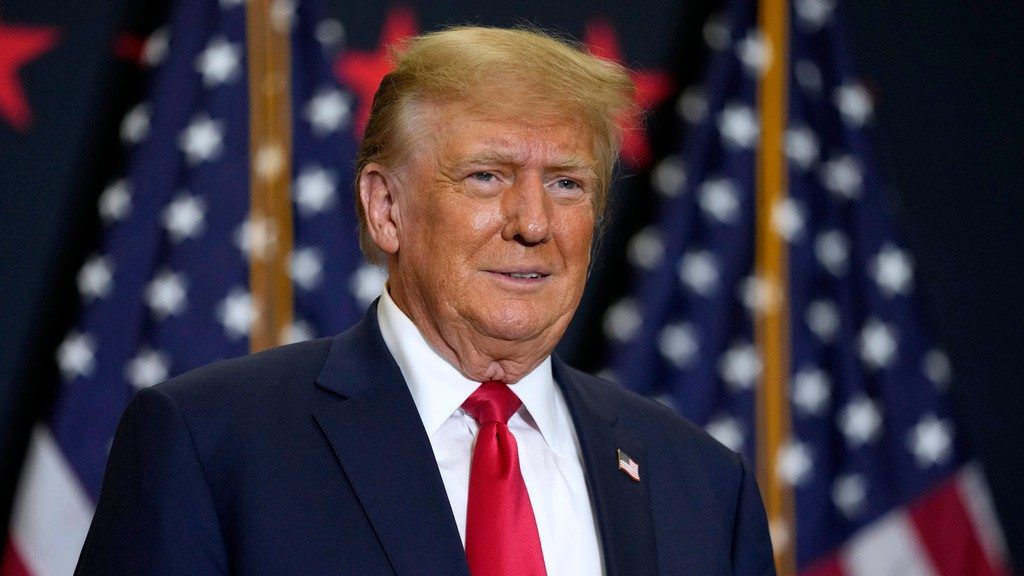The Oregon Supreme Court said Friday it will not, at least for now, consider a challenge to former President Donald Trump’s eligibility to run for the White House again.
What You Need To Know
- The Oregon Supreme Court said Friday it will not, at least for now, consider a challenge to former President Donald Trump’s eligibility to run for the White House again
- Point 2 goes hereA Colorado court and Maine’s top election official have ruled that Trump is ineligible over his efforts to overturn the 2020 presidential election and actions on Jan. 6, 2021, when a mob of his supporters stormed the U.S. Capitol as the vote was being certifiedPoint 3 goes here
- The Oregon Supreme Court said it would not hear the case brought by five voters there because the U.S. Supreme Court’s ruling in the Colorado case “may resolve one or more contentions that relators make in the Oregon proceeding"
- The justices did not weigh in on the merits of the challenge, and they indicated they may later consider the case
Section 3 of the 14th Amendment disqualifies anyone from serving in a wide range of offices if they have taken an oath to protect the Constitution and then “engaged in insurrection or rebellion.”
A Colorado court and Maine’s top election official have ruled that Trump is ineligible over his efforts to overturn the 2020 presidential election and actions on Jan. 6, 2021, when a mob of his supporters stormed the U.S. Capitol as the vote was being certified.
The former president has appealed both rulings. The U.S. Supreme Court agreed last week to hear his appeal in the Colorado case, a decision that is expected to have ramifications in other states.
The Oregon Supreme Court said it would not hear the case brought by five voters there because the U.S. Supreme Court’s ruling in the Colorado case “may resolve one or more contentions that relators make in the Oregon proceeding.”
Oregon Secretary of State LaVonne Griffin-Valade said in November state law does not give her the authority to remove Trump from the primary ballot. Free Speech for People, a watchdog group representing the five voters, appealed the decision to the state Supreme Court.
The justices did not weigh in on the merits of the challenge, and they indicated they may later consider the case.
The U.S. Supreme Court will hear arguments in the Colorado case on Feb. 8. Oregon’s ballots for its May 21 primaries must be finalized by March 21, the court said.
Trump campaign spokesperson Steven Cheung called the court’s decision “the correct one.”
“President Trump urges the swift dismissal of all remaining, bad-faith, election interference 14th Amendment ballot challenges as they are un-Constitutional attempts by allies of Crooked Joe Biden to disenfranchise millions of American voters and deny them their right to vote for the candidate of their choice,” Cheung said in a statement. “President Trump will continue to fight these desperate shams, win in November and Make America Great Again.”
Free Speech for People called the Oregon justices’ decision “disappointing.”
“While it is certainly possible that the U.S. Supreme Court’s decision in Trump v. Anderson may resolve some or all of the issues in this case, it is also entirely possible that the U.S. Supreme Court may resolve that case based on particular details of the Colorado proceeding or that it may issue an order that does not resolve this case,” the group said in a statement. “Furthermore, no one knows when that decision will issue. Waiting until the U.S. Supreme Court issues its order only compresses the time that the Oregon Supreme Court may have to resolve the issues that may remain if the U.S. Supreme Court does not fully resolve all the issues in this case.”
According to a tracker by The Lawfare Institute, there are challenges to Trump’s eligibility pending in 15 states. Cases in 17 other states have been dismissed, including nine voluntarily by the plaintiffs.
Free Speech for People is also representing voters in challenges in Illinois and Massachusetts.



